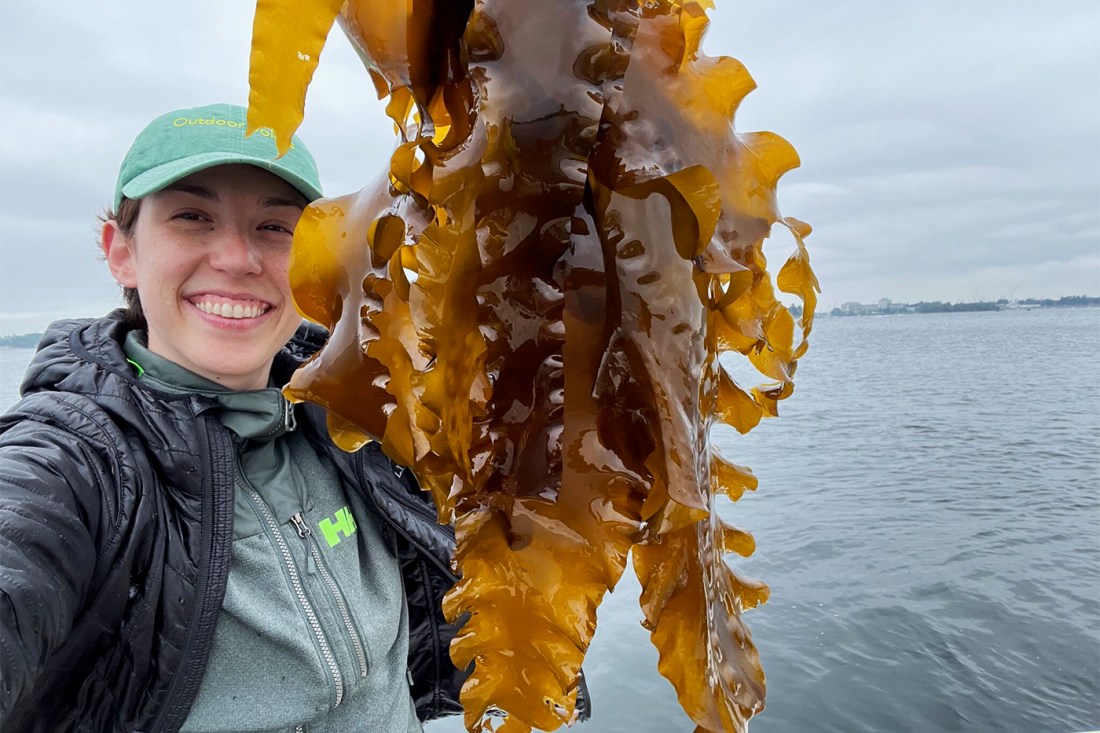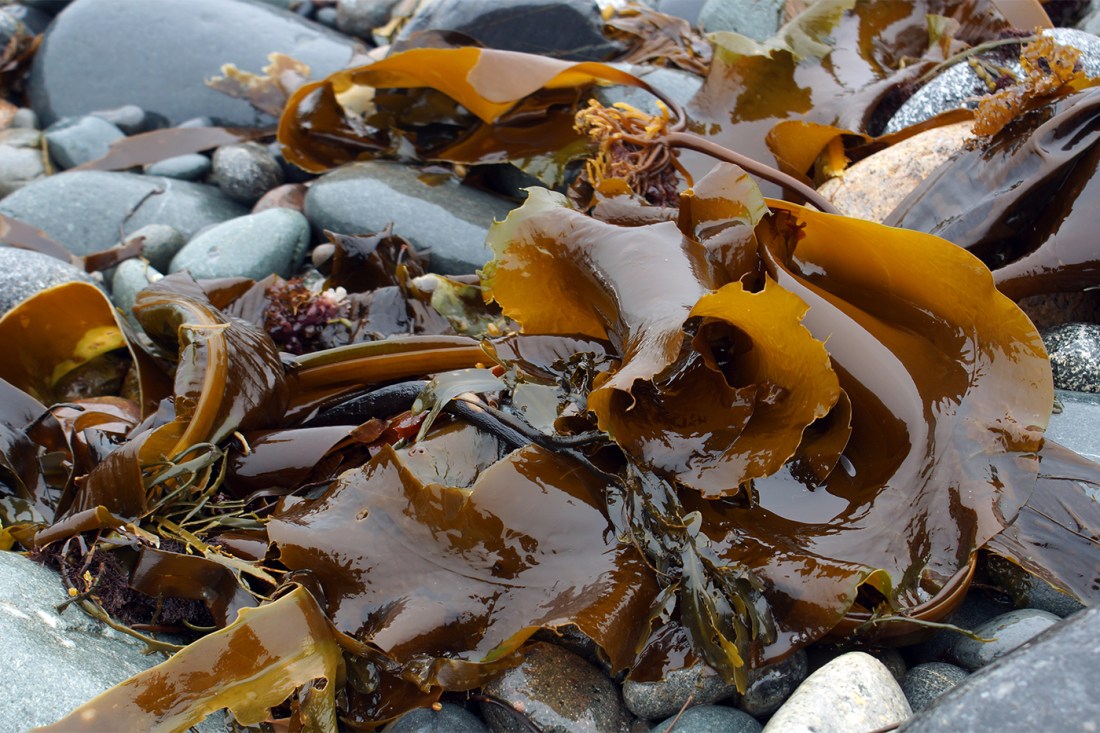How a young mom’s cancer journey sparked a kelp-based alternative to plastic
After surviving breast cancer, Alexa Coulombe McGovern focused on creating kelp-based sustainable alternatives to plastic.

In March 2024, a breast cancer diagnosis abruptly put Alexa Coulombe McGovern’s life on hold. The cause of the disease was unclear and the graduate of a Northeastern startup residency program wasn’t a typical cancer patient.
She didn’t belong to a high-risk group and at age 29 was too young to qualify for a mammogram, she says. She was also a new mom on a mission – exploring a business idea of creating bioplastic alternatives from kelp.
“A lot of my oncology and care team would talk about environmental causation and just general toxin exposure,” she says.
After a double mastectomy, chemotherapy and radiation, Coulombe McGovern was declared disease-free. But she couldn’t stop thinking about how to reduce exposure to toxins and microplastics that might have played a role in her illness.
So she set out to develop bioplastic alternatives to single-use, non-biodegradable plastics using kelp, through her startup, Dirigo Sea Farm. And her resilience paid off.
Recently, Coulombe McGovern won first prize in the “Sustainability” category at the 2025 Women Who Empower Innovator Awards that recognize promising female entrepreneurs and changemakers in Northeastern’s ecosystem and support them with capital and other resources.
The Innovator Awards celebrate Northeastern students, graduates and affiliated entrepreneurs making an impact in health, technology, sustainability and social innovation. Over the past five years, Women Who Empower has invested more than $1.8 million in winners building and scaling their ventures.
“I think that award is so great because of that emphasis on women. I’ve witnessed a lot of women in my network deflect recognition or not emphasize themselves ahead of others,” she says. “The idea that this award is really focused on that is special.”
Kelp on her mind
Coulombe McGovern first learned about kelp farming in Maine, where she grew up, while reading on a plane.
“I knew nothing about it, except for the fact that I really liked what it was doing for the fishing communities in Maine and the commercial fishing industry,” she says. “They could leverage their know-how, their equipment and their off-season to drive additional revenue.”

She admired the “creative hack,” says Coulombe McGovern, whose background is in sales, marketing and product management for consumer packaged goods and software solutions. But she wasn’t sure how she could get involved.
As the industry took off — Maine now leads among U.S. states in farmed seaweed production — Coulombe McGovern began thinking about a high-volume kelp application beyond food.
As a new mom, she worried about microplastic contamination and wondered whether seaweed could replace crude oil in products such as water-soluble films used for detergent pods.
“It’s actually been, historically, very much promoted as biodegradable, which new research is showing that that’s not the case,” she says.
Working with a polymer chemistry scientist, Coulombe McGovern helped develop the first prototype — in a home kitchen.
“That’s when we decided to go at it more full time,” she says.
Roux Founder Residency
At the same time, Coulombe McGovern entered Northeastern’s 2025 Roux Founder Residency program on the Portland, Maine, campus. The one-year program helps startups refine their business models and raise capital.
“The Roux and MTI are really the main reason that we can exist as a company right now, because the access to the capital was super flexible and non-diluted,” Coulombe McGovern says. “They wanted to fund people that were taking risks and starting something new.”


With a small team, she was able to set up a lab and start piloting the first version of their product.
“We basically did everything in that lab and then in a warehouse setup for some of our messier and bigger-scale manufacturing pilots,” she says.
Getting into a big boys’ club
Dirigo Sea Farm uses Maine-grown seaweed and extracts different compounds out of it, mixes it into a slurry-like consistency and turns that into rolls of thin, flexible film.
“There’s a lot of know-how. There’s a lot of testing, research that’s gone into how we can get that to work and be true,” she says.
The company holds a provisional patent on the entire process and end material of the film and another provisional patent for a different but similar application.
Editor’s Picks
Now, the company has its first customer — a laundry and dish pod manufacturer. The team is racing to fulfill the initial purchase order before the end of the year, with the final product being co-manufactured in Chicago.
“We’re producing all of the inputs to the film and then they’re creating reams of the film,” Coulombe McGovern says.
Next year, the company plans to invest in a larger filtration device to boost processing capacity and serve more customers. Other potential clients are interested in carrier film applications that deliver something like a detergent solution and dissolve in the process.
Dirigo Sea Farm aims to produce nearly 40,000 pounds of the film next year and triple that output soon after.
“After we nail this launch with this one customer, it will be about how fast we can acquire others,” Coulombe McGovern says.
To make its materials compatible with existing plastics machinery, the company’s film must withstand high heat and pressure while remaining water-soluble.
A small kelp farm for fun — and R&D
Last year, Coulombe McGovern also leased a 400-square-foot ocean plot to grow kelp.
“It’s basically an underwater clothesline,” she says. “A piece of rope flows between two major anchor buoys 10 feet below the sea level, and you just seed the seaweed onto that rope.”
Farmers seed kelp spores in the fall and harvest in early spring. This year, she says, the company harvested about 1,000 to 1,500 pounds of kelp — enough for experiments and material testing.
“We just bring it into the lab when we need some, and then we run different tests on it. And that’s really what it’s meant for — R&D, so that we can have a stockpile that we can pull from,” Coulombe McGovern said.











